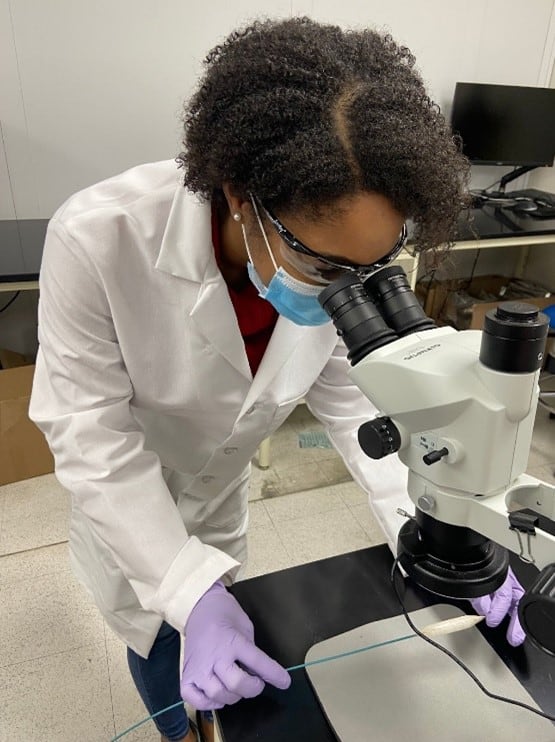
From a young age, I’ve always had a knack for science and math. I also grew up with a parent that was a Civil Engineer, so I had an idea of what engineering was. I didn’t seriously consider studying engineering in college until my junior year of high school, where I was invited to attend a six-week residential summer program that focused on engineering and science concepts. At the program, I got hands-on experiences and took STEM classes. Even then, I had thought I wanted to major in Computer Science with a math focus, which is something that I picked up from my summer program experience.
During my first year of college, we had to take a chemistry class, and I had to choose between the traditional Introduction to Chemistry or the Materials Science class. I ended up taking the Materials Science version mostly because of class time and availability. In hindsight, this ended up being the best decision ever! I completed my bachelor’s degree at the Massachusetts Institute of Technology (MIT) where my major was Course 3: Materials Science and Engineering (everything at MIT is identified by numbers, even our majors). What I learned then and continue to love about Materials Science is that it is so versatile and really lends itself to many different industries, from biotechnology, aerospace, civil, energy, auto, beauty, electronics, and almost everything in between. Materials are involved in everything; finding out the properties of a material, what makes it most ideal for certain applications, and how to make the material better are at the core of materials science.
While in college, the experiences that stood out most were my internship at the US Army Research Lab, biomaterials research experience, and internship abroad. At the US Army Research Lab, I noticed almost everyone had a PhD and I learned where this degree could take me as an independent researcher. When I worked in a biomaterials lab alongside postdoctoral researchers and graduate students, I started to really solidify my materials interest and learned even more about what graduate school entails. When I did an internship at a university abroad, I felt that I could really spread my wings and be on my own in a new country, which I would highly recommend as many schools offer this opportunity!
After I graduated from MIT, I then went on to get my PhD at the University of Michigan in Macromolecular Science and Engineering, which is pretty much Materials Science with a polymers focus. Polymers are large molecules and can make up natural or man-made materials, like plastics. I completed my PhD in May 2020 and then went on to work in the industry. I found my niche in the biomaterials/medical technology (MedTech) space, and it’s been a fun ride! What’s great about my field is that if the perfect opportunity came along and if I was feeling adventurous, with the foundation that I have and skills I’ll continue to develop (like project management), I would be able to switch industries a bit and apply my materials knowledge elsewhere – and that’s pretty cool!

I’m currently a senior engineer at Becton Dickinson (BD), which is a global medical device company. I’m in a rotational program that allows me to work on a few different teams for my first 5-6 years in the company. The team I’m currently on works on developing drug-coated devices to help open blocked arteries and veins. What I like best about my job is how collaborative it is and how many different teams like research and development (R&D), medical affairs, quality assurance, and others are involved to get a product approved and out to customers. Each team focuses on a different part of the product, like the research to make the prototype, testing the product out in a medical (clinical) setting, and making sure the product is of high quality. Especially after being involved in similar research during graduate school, it is amazing to see how devices leave the lab and get into the hands of doctors.
I would tell young girls interested in engineering to stay curious about the world around them, ask questions even if they seem simple, and to not be intimidated by the parts of engineering, math, or science that seem “too hard” – you really can do it! Always be open to new things, even when you think you already know what you want to do or what the answer to something is. You never know where it can lead you or what else you can learn. For Materials Science specifically, find a school that has a strong program and great research that you would be interested in learning more about. Finally, I love serving as a mentor to young girls that are thinking about engineering, so my last piece of advice would be to find a mentor who you can constantly ask questions and who can encourage you on your journey!
Author
-

SWE Blog provides up-to-date information and news about the Society and how our members are making a difference every day. You’ll find stories about SWE members, engineering, technology, and other STEM-related topics.






